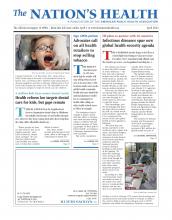When you develop a cough and a runny nose, you may brush those off as symptoms of a common cold that can be beaten with rest and fluids.
But it’s when those symptoms persist and combine with a fever and rash that points to signs of something more serious: measles.
Measles is a highly contagious disease. It’s a virus that makes its home in your throat and lungs, and can be spread through coughing, sneezing and breathing, according to the Centers for Disease Control and Prevention. Luckily, there is a vaccine for measles, which means there are few U.S. cases each year. But the disease is sometimes spread by people who bring the virus with them from countries where vaccination rates are lower.
Vaccination is key to preventing measles.
Parents should make sure a health care provider vaccinates their children at ages 12 months to 15 months and with a second dose between ages 4 and 6, says Gregory Wallace, MD, MPH, MS, leader of the measles, mumps, rubella and polio team in the Epidemiology Branch of CDC’s National Center for Immunization and Respiratory Diseases’ Division of Viral Diseases. Children can get a second dose sooner, but they must wait at least four weeks after the first dose.

Keeping up with vaccinations helps kids stay healthy. Vaccine schedules are available online from CDC.
Photo courtesy Yarinca, iStockphoto
But vaccination is not just for kids. In general, adults who’ve never been fully vaccinated against measles should get one dose of the vaccine. Two doses are recommended for unvaccinated adults in high-risk environments, such as health care facilities, according to CDC.
Skipping vaccinations not only endangers your health and the health of your children, it also leaves other children and adults at risk for infection.
Measles can also lead to other health issues. Ear infections are common in one out of every 10 children who get the measles, and one in 20 kids with measles are likely to get pneumonia, according to CDC. The disease can also be fatal, causing more than 100,000 deaths around the world each year.
“Measles is perhaps the most contagious of vaccine-preventable diseases, so just being in the same room as somebody with measles or even being in the room one to two hours after a person with measles has left can lead to a spread to other people who have not been vaccinated,” Wallace says.
What to do if you’re sick
It’s important to know the steps to take if you or someone you know may have the disease.
If you think you have the measles, the first thing you should do is to call your health care provider, Wallace says.
“Let them know before you just go into the office, because if you go in with active measles you could expose the waiting room,” Wallace says. “You should always call ahead before going to see your health care provider.”
Also, make sure that you stay away from others, which means avoiding public places, including your school or job, he says.
If it turns out you do have the measles, your local public health department can also help prevent the disease from spreading, Wallace says.
“The public health department will make sure that anyone you may have been in contact with while you’re contagious has been protected by being vaccinated,” Wallace says. “Or they can also be isolated so that they don’t spread (it) to others.”
Travel poses risks
If you are traveling out of the country, always make sure you are up to date on all of your vaccinations, including measles. Check for alerts from public health agencies, such as CDC, to stay informed about whether there have been any outbreaks in your destination. If you are traveling with your children, make sure they are up to date on vaccinations as well.
“If you’re going to travel to other countries, you should accelerate getting that second dose,” Wallace says. “Even travelers who are 6 to 11 months of age should get an early dose prior to travel.”
And just because you’re not traveling doesn’t mean measles won’t make the trip to you. Cases of the disease occur regularly around the world. That means people who come to America from countries where measles vaccination isn’t high can put communities in the U.S. at risk, Wallace says.
Keeping track of vaccinations
Kids need many vaccinations, and keeping track of them all can be hard. Your health provider will keep immunization records, but you should also keep your own. Luckily, there are tools that can help.
CDC has free schedules you can download and print from the agency’s website at www.cdc.gov/vaccines/schedules.
Online tracking tools, such as the Catch-Up Immunization Scheduler, are another way for parents to stay on schedule. The scheduler, created by CDC and the Georgia Institute of Technology, is available at https://www.vacscheduler.org. There are also free apps you can download for your smartphone.
For more information on measles, visit www.cdc.gov/measles.
- Copyright The Nation’s Health, American Public Health Association









